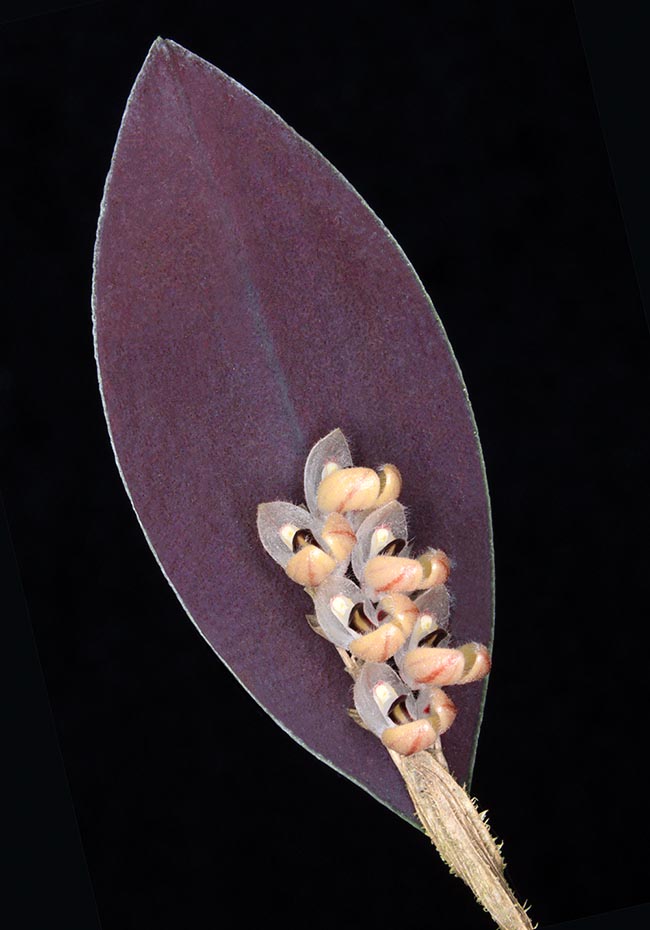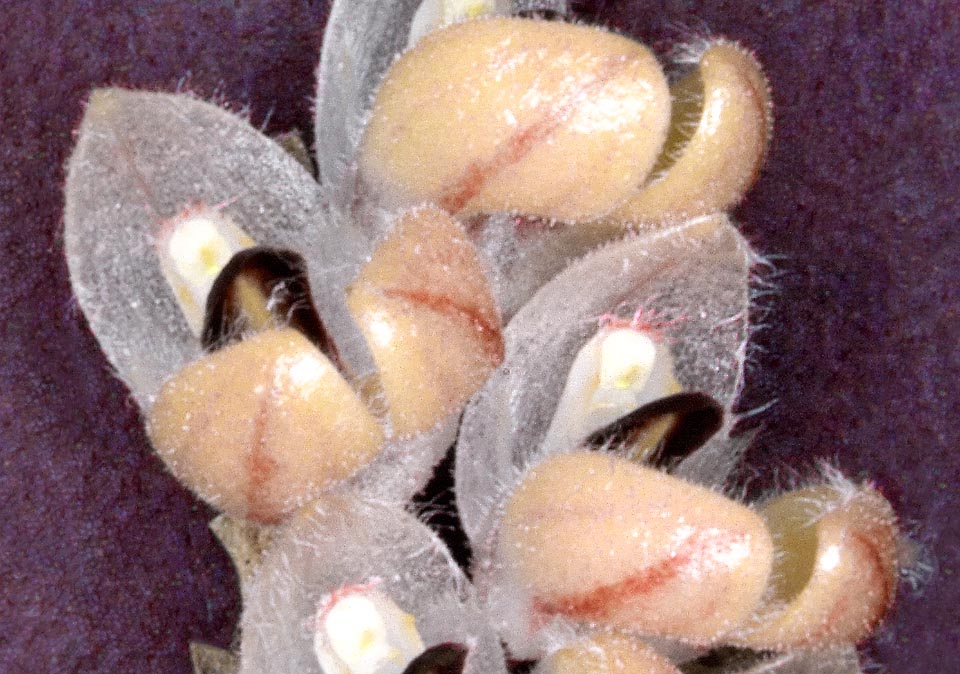Family : Orchidaceae

Text © Pietro Puccio

English translation by Mario Beltramini

Mini orchid of Costa Rica and Panama, the Trichosalpinx rotundata is a cespitose epiphyte. The stems are provided at the apex of one only leaf, 2-4 cm long and 1,7-3 cm broad, on a short petiole, suffused with purple below © G. Mazza
The species is native to Costa Rica and Panama where it grows in the humid forests between 400 and 1600 m of altitude.
The name of the genus is the combination of the Greek substantives “θρίξ, τριχός” (thrix, trichós) = hair, and “σάλπιγξ” (salpinx) = trumpet, with reference to the shaggy sheaths that are covering the stems; the name of the species is the Latin adjective “rotundatus, i” = rounded, with reference to the shape of the leaf.
Common names: umbrella orchid (English).
The Trichosalpinx rotundata (C.Schweinf.) Dressler (1997) is a cespitose epiphyte species with short rhizome and thin stems, 2-10 cm tall, wholly covered by 4-11 tubular shaggy sheaths ending with an ovate-acuminate infundibuliform expansion with ciliate margin, similar to those of the Lepanthes.
The stems have at the apex only one leaf, on a short petiole, erect, oval to suborbicular with obtuse to rounded apex and subtruncated or rounded base, more or less convex, 2-4 cm long and 1,7-3 cm broad, of dark green colour above, suffused with purple below.
Numerous axillar inflorescences shorter than the leaves, with 2-3 membranous flowers of yellow colour suffused with pink that open at the same time under the concave side of the leaf.
Triangular-lanceolate dorsal sepal with acute apex, about 6 mm long and 2 mm broad, triangular-lanceolate lateral sepals with obtuse apex, about 5 mm long, united at the base for about one third of their length.
Oblong petals, about 2 mm long and 1 mm broad, lanceolate labellum with acuminate apex and margins fringed in the lower half, about 3 mm long and 1 mm broad.
It reproduces by seed, in vitro, and by division with each section provided of at least 3-4 stems.
Mini orchid with particular inflorescences placed under the leaves, as if to shelter from the continuous rains, requires a semi shaded position, intermediate temperatures, with lowest night ones not under the 15 °C, high humidity, 70-85 %, and constant movement of air. It is preferably mounted on pieces of bark, or rafts of cork or of roots of arborescent ferns covered by sphagnum to maintain the humidity at the roots, alternatively, can be cultivated in pot utilizing a perfectly draining and aerated substratum that may be formed by fragments of bark finely sliced and charcoal,with addition of sphagnum.

Axillar inflorescences on more stems, shorter than the leaves, with tiny membranous flowers of yellow colour suffused with pink opening all together under the the leaf concave part: a sort of umbrella to protect them from the frequent rains. Not easy cultivation because requires high humidity and constant movement of air © G. Mazza
The watering must be regular in way to maintain constantly humid the substratum, but without stagnations, that may cause rottenness, even daily for the mounted plants, utilizing rainwater, by reverse osmosis or de-mineralized. Opportunely spaced fertilizations and spaced out with the watering, in way to avoid salt accumulations at the roots, utilizing a product specific for orchids at ¼ of the dosage shown in the package.
The species is inscribed in the appendix II of the CITES (species whose trade is internationally ruled).
Synonyms: Pleurothallis rotundata C.Schweinf. (1937); Pleurothallis operculata Luer (1981); Trichosalpinx operculata (Luer) Luer (1983).
